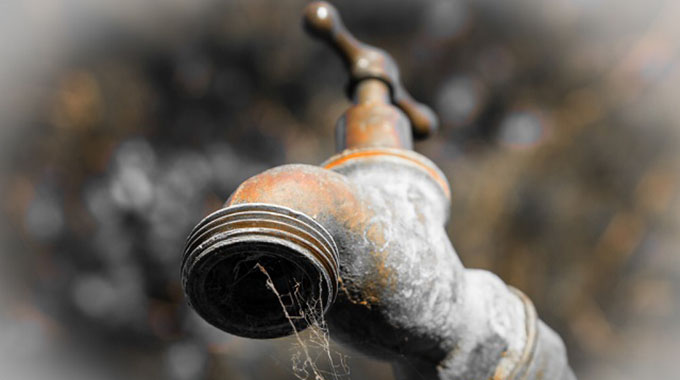Harare sends mixed signals on water woes

Blessings Chidakwa Municipal Correspondent
Harare City Council appears to have run out of ideas on how to deal with the city’s water woes as it is failing to supply the precious liquid despite mananging to secure the water treatment chemicals which they had been citing as the major reason behind the challenges.
The local authority last week announced that water supplies would normalise by end of that week after delivery of treatment chemicals but the situation has largely remained unchanged.
Most parts of Harare have been without water for more than a week now raising fears of the outbreak of water-borne diseases as some residents are reportedly fetching the precious liquid from unprotected sources.
In a statement yesterday, the municipality said: “Harare’s current water challenges are a result of drought, shortage of foreign currency to procure water treatment chemicals on time and power challenges affecting Zimbabwe. Our water plants have not been spared from power cuts,” reads the statement.
Initially, Harare City Council had said: “The water situation is set to improve starting tomorrow July 3 when council is expecting the delivery of chemical chlorine gas. Logistical problems had delayed delivery of the chemical.”
Harare’s failure to supply water has also been worsened after two critical dams, Seke and Harava, have dried up making it difficult for council to treat water at Prince Edward water plant.
The plant contributes 70 megalitres of water a day, of which 30 megalitres was dedicated to Chitungwiza and the remaining 40 megalitres was supplied to Mbare, Sunningdale and surrounding areas.
However, speaking to our sister paper on Saturday Town Clerk Engineer Hosiah Chisango assured residents that Harare had adequate water in its reservoirs.
“Our two main reservoirs, Lake Chivero and Manyame Dam, can take us up to April 2020. We reduced the abstraction rate so that we can stretch to September or October 2020.
“The challenge is also on siltation in both dams due to upstream agricultural activities. This has reduced the holding capacities of the reservoirs,” he said.
The city in January this year introduced water rationing, resulting in some suburbs getting supplies three days a week, before extending the exercise in the northern suburbs to 72 hours per week.
Meanwhile, Harare City Council is in the process of rehabilitating grit elevators and biological water filters at Firle and Crowborough wastewater treatment plants to improve reticulation and increase wastewater treated at the plant, reports Yeukai Karengezheka.
The two plants receive 205 megalitres per day of wastewater, with 83 megalitres being treated to satisfactory effluent quality as per Environmental Management Agency standards.
According to recent Environmental Management Committee minutes, City Engineer Mabhena Moyo reported that the treatment capacity has been affected by numerous breakdowns at the major treatment plants that have been treating only 83 megalitres instead of 219 mega litres per day.
The city’s waste management services encompass collection, conveyance, treatment and disposal of sewage from Harare to five sewage treatment plants. It has more than 5 500km of sewage reticulation collection networks.
“During the period under review, the treatment plants received 205mg/l of waste water with only 83mg/l being treated to satisfactory effluent quality according according to Environmental Management Agency standards,” read the minutes.
Numerous breakdowns at the major treatment plants of Firle and Crow borough were affecting the treatment capacity.
“Repair of grit elevators at Firle, BNR units and biological filters at both plants is currently underway to urgently increase the capacity by 126 megalitres per day to cover the shortfall,” read the minutes.
The city also plans to purchase sewer rods to augment high velocity and vacuum jet mobile vehicles in scouring and removing sand from the reticulation system.
Council believes through carrying out rehabilitation works at all major reticulation systems and treatment infrastructures, public health threats and environmental pollution would drastically be reduced.









Comments